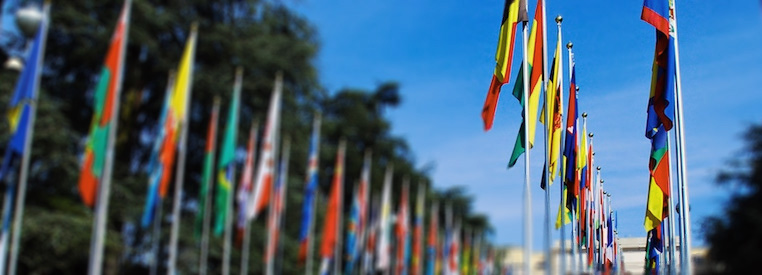On 11-12 October 2004, governmental representatives from 25 countries gathered in Lausanne, Switzerland, at the invitation of the Foreign Minister of Switzerland, for the twenty-seventh annual colloquium on human rights policy. Included, for the first time, were new European Union states.
Colloquium 2004 | Lausanne, Switzerland | Agenda
Skip to a section:
- Reform of the human rights mechanisms
- Application of human rights norms to non-state actors
- Human rights and the “war on terror”
- Water as a human right
I. REFORM OF THE HUMAN RIGHTS MECHANISMS
Special Procedures
- Are the Special Procedures (working groups, Special Rapporteurs, independent experts, etc.) effective in filling their mandates? Which are performing better than others?
- Should they receive additional resources from the regular budget or from donor governments?
- Which, if any, current mandates should be terminated and which new ones should be added?
Treaty Bodies
- What reforms will solve the problems of overdue reports?
- Should new optional protocols be adopted?
- To what extent are general comments helpful to governments and how could they be improved? Have any of them exceeded the authority of the treaty bodies?
Other Related Human Rights Mechanisms
- Should a new Human Rights Council be created and, if so, how would it relate to similar existing bodies?
- Should the Security Council be more involved in situations of serious human rights violations?
- How can the regional human rights bodies (Council of Europe, OAS, African Union) be more effective in investigating and judging human rights violations?
II. APPLICATION OF HUMAN RIGHTS NORMS TO NON-STATE ACTORS
Transnational Corporations
- Should the “Draft Norms on the Responsibility of Transnational Corporations and Other Business Enterprises” be supported and, if so, how?
- Is the critique of the Global Compact, inter alia, during the summit in June 2004, well founded and what should be done to make it more effective?
- What rules govern accountability for human rights violations committed by agents of private corporations acting under government contract?
Human Rights Defenders
- Have the “Declarations on the Right and Responsibility of Individuals, Groups, and Organs of Society to Promote and Protect Universally Recognized Human Rights and Fundamental Freedoms” (Defenders’ Declarations) and the Special Representative of the Secretary-General on the situation of human rights defenders been effective?
- How could the implementation on the Defenders’ Declaration be improved?
- How can NGOs work effectively on behalf of human rights defenders?
III. HUMAN RIGHTS AND THE “WAR ON TERROR”
Relations between Human Rights and Terrorism
- What human rights are violated by acts of terrorism?
- What human rights are at risk by measures to prevent and respond to acts of terrorism?
- What human rights apply to persons accused of terrorism and captured outside the territorial jurisdiction of the capturing state?
- Are existing norms dealing with acts of terrorism and financing of terrorist organizations adequate? What new norms, if any, should be considered?
International Concern with Terrorism and Human Rights
- Can the “war on terror” be based on the inherent right of self-defense as authorized under Article 51 of the UN Charter?
- What can be expected from the independent expert on counter-terrorism and human rights, appointed in accordance with the 2004 Commission on Human Rights resolution?
- Have measures taken under the “war on terror” encouraged countries to adopt laws that endanger human rigths?
- Should more attention be paid to the formal requirements of Article 4 of the ICCPR, and its equivalent in the European and American Conventions on Human Rights in terms of notification of suspension of rights?
CESCR General Comment 15 (GC 15)
- Does GC 15 posit a “new” human right or is it a legitimate extension of existing human rights?
- Is it helpful to focus on complex problems of resources, the environment, infrastructure, and politics–like water–in human rights terms?
Government Policy on Water
- What can governments do to deal with water as a human right?
- How can major financial and development institutions like the World Bank and UNDP be engaged in promoting water as a human right?
